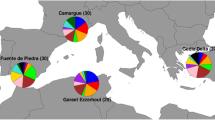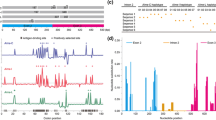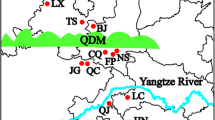Abstract
The major histocompatibility complex (MHC) is a highly polymorphic gene group that mediates the vertebrate immune response through antigen recognition and presentation. The ability to face an emerging infectious disease is greatly attributable to the genetic diversity of the MHC genes due to its main role in the adaptive immune response of vertebrates. The Huillín (Lontra provocax) is an endangered otter from southern Chile whose populations have been threatened due to illegal fur trade and displaced as a result of land use change in southern Chile, facilitating contact with domestic animals and allowing the transmission of infectious diseases. In this study, MHC loci from wild populations of L. provocax were assessed for the first time. Variation and signature of selection were estimated for MHC class I exons 2 and 3, and MHC class II DRB exon 2. Low genetic diversity was found for MHC whereas signatures of historical positive selection are suggested but inconclusive. The recent population bottleneck that occurred in L. provocax due to anthropogenic pressures might have unchained a strong genetic drift that overcomes the effects of positive selection in the MHC loci, diminishing genetic diversity and erasing signatures of selection. These results suggest that L. provocax has a low adaptive capacity and, therefore a great susceptibility to the spread of diseases from domestic and invasive animals towards the endangered L. provocax. This should be considered as a warning about the vulnerability of the species to face emerging infectious diseases.



Similar content being viewed by others
Availability of data and material
MHC sequences: GenBank accession numbers MZ889577-MZ889592.
References
Abduriyim S, Nishita Y, Kosintsev PA et al (2019) Evolution of MHC class I genes in Eurasian badgers, genus Meles (Carnivora, Mustelidae). Heredity 122:205–218. https://doi.org/10.1038/s41437-018-0100-3
Aljanabi SM, Martinez I (1997) Universal and rapid salt-extraction of high quality genomic DNA for PCR-based techniques. Nucleic Acids Res 25:4692–4693. https://doi.org/10.1093/nar/25.22.4692
Barros M, Sáenz L, Lapierre L et al (2014) High prevalence of pathogenic Leptospira in alien American mink (Neovison vison) in Patagonia. Rev Chil De Hist Nat 87:19. https://doi.org/10.1186/s40693-014-0019-x
Barros M, Cabezón O, Dubey JP et al (2018) Toxoplasma gondii infection in wild mustelids and cats across an urban-rural gradient. PLoS ONE 13:e0199085. https://doi.org/10.1371/journal.pone.0199085
Becker L, Nieberg C, Jahreis K, Peters E (2009) MHC class II variation in the endangered European mink Mustela lutreola (L. 1761)—consequences for species conservation. Immunogenetics 61:281–288. https://doi.org/10.1007/s00251-009-0362-2
Bjorkman PJ, Saper MA, Samraoui B et al (1987) The foreign antigen binding site and T cell recognition regions of class I histocompatibility antigens. Nature 329:512–518. https://doi.org/10.1038/329512a0
Brambilla A, Keller L, Bassano B, Grossen C (2018) Heterozygosity–fitness correlation at the major histocompatibility complex despite low variation in Alpine ibex (Capra ibex). Evol Appl 11:631–644. https://doi.org/10.1111/eva.12575
Brown JH, Jardetzky TS, Gorga JC et al (1993) Three-dimensional structure of the human class II histocompatibility antigen HLA-DR1. Nature 364:33–39. https://doi.org/10.1038/364033a0
Centrón D, Ramirez B, Fasola L et al (2008) Diversity of mtDNA in Southern River Otter (Lontra provocax) from Argentinean Patagonia. J Hered 99:198–201. https://doi.org/10.1093/jhered/esm117
Chehebar CE (1985) A survey of the southern river otter Lutra provocax Thomas in Nahuel Huapi National Park, Argentina. Biol Cons 32:299–307. https://doi.org/10.1016/0006-3207(85)90020-5
Doherty TS, Dickman CR, Glen AS et al (2017) The global impacts of domestic dogs on threatened vertebrates. Biol Cons 210:56–59. https://doi.org/10.1016/j.biocon.2017.04.007
Furlong RF, Yang Z (2008) Diversifying and purifying selection in the peptide binding region of DRB in mammals. J Mol Evol 66:384–394. https://doi.org/10.1007/s00239-008-9092-6
Jukes TH, Cantor CR (1969) Evolution of protein molecules. In: Munro HN (ed) Mammalian protein metabolism. Academic Press, New York, pp 21–132
Klein J (1986) Natural history of the major histocompatibility complex. Wiley, New York
Klein J, Bontrop RE, Dawkins RL et al (1990) Nomenclature for the major histocompatibility complexes of different species: a proposal. Immunogenetics 31:217–219. https://doi.org/10.1007/BF00204890
Kosakovsky Pond SL, Frost SDW (2005) Not so different after all: a comparison of methods for detecting amino acid sites under selection. Mol Biol Evol 22:1208–1222. https://doi.org/10.1093/molbev/msi105
Kosakovsky Pond SL, Poon AFY, Velazquez R et al (2020) HyPhy 2.5—A customizable platform for evolutionary hypothesis testing using phylogenies. Mol Biol Evol 37:295–299. https://doi.org/10.1093/molbev/msz197
Kumar S, Stecher G, Li M et al (2018) MEGA X: Molecular Evolutionary Genetics Analysis across computing platforms. Mol Biol Evol 35:1547–1549. https://doi.org/10.1093/molbev/msy096
Lan H, Zhou T, Wan Q-H, Fang S-G (2019) Genetic diversity and differentiation at structurally varying MHC haplotypes and microsatellites in bottlenecked populations of endangered Crested Ibis. Cells 8:377. https://doi.org/10.3390/cells8040377
Medina G (1995) Conservation and status of Lutra provocax in Chile. Pac Conserv Biol 2:414–419. https://doi.org/10.1071/pc960414
Meyer-Lucht Y, Otten C, Püttker T et al (2010) Variety matters: adaptive genetic diversity and parasite load in two mouse opossums from the Brazilian Atlantic forest. Conserv Genet 11:2001–2013. https://doi.org/10.1007/s10592-010-0093-9
Murrell B, Wertheim JO, Moola S et al (2012) Detecting individual sites subject to episodic diversifying selection. PLoS Genet 8:e1002764. https://doi.org/10.1371/journal.pgen.1002764
Murrell B, Moola S, Mabona A et al (2013) FUBAR: A Fast, Unconstrained Bayesian AppRoximation for inferring selection. Mol Biol Evol 30:1196–1205. https://doi.org/10.1093/molbev/mst030
Nei M, Gojobori T (1986) Simple methods for estimating the numbers of synonymous and nonsynonymous nucleotide substitutions. Mol Biol Evol 3:418–426. https://doi.org/10.1093/oxfordjournals.molbev.a040410
Oliver MK, Piertney SB (2012) Selection maintains MHC diversity through a natural population bottleneck. Mol Biol Evol 29:1713–1720. https://doi.org/10.1093/molbev/mss063
Pereira F, Soares P, Carneiro J et al (2008) Evidence for variable selective pressures at a large secondary structure of the human mitochondrial DNA control region. Mol Biol Evol 25:2759–2770. https://doi.org/10.1093/molbev/msn225
Phillips KP, Cable J, Mohammed RS et al (2018) Immunogenetic novelty confers a selective advantage in host–pathogen coevolution. PNAS 115:1552–1557. https://doi.org/10.1073/pnas.1708597115
Piertney SB, Oliver MK (2006) The evolutionary ecology of the major histocompatibility complex. Heredity 96:7–21. https://doi.org/10.1038/sj.hdy.6800724
Radwan J, Babik W, Kaufman J et al (2020) Advances in the evolutionary understanding of MHC polymorphism. Trends Genet 36:298–311. https://doi.org/10.1016/j.tig.2020.01.008
Rico Y, Morris-Pocock J, Zigouris J et al (2015) Lack of spatial immunogenetic structure among wolverine (Gulo gulo) populations suggestive of broad scale balancing selection. PLoS ONE 10:e0140170. https://doi.org/10.1371/journal.pone.0140170
Rozas J, Ferrer-Mata A, Sánchez-DelBarrio JC et al (2017) DnaSP 6: DNA sequence polymorphism analysis of large data sets. Mol Biol Evol 34:3299–3302. https://doi.org/10.1093/molbev/msx248
Sagonas K, Runemark A, Antoniou A et al (2019) Selection, drift, and introgression shape MHC polymorphism in lizards. Heredity 122:468–484. https://doi.org/10.1038/s41437-018-0146-2
Salmier A, de Thoisy B, Crouau-Roy B et al (2016) Spatial pattern of genetic diversity and selection in the MHC class II DRB of three Neotropical bat species. BMC Evol Biol 16:229. https://doi.org/10.1186/s12862-016-0802-1
Sepúlveda MA, Muñoz-Zanzi C, Rosenfeld C et al (2011) Toxoplasma gondii in feral American minks at the Maullín river, Chile. Vet Parasitol 175:60–65. https://doi.org/10.1016/j.vetpar.2010.09.020
Sepúlveda MA, Singer RS, Silva-Rodríguez EA et al (2014) Invasive American Mink: linking pathogen risk between domestic and endangered carnivores. EcoHealth 11:409–419. https://doi.org/10.1007/s10393-014-0917-z
Sepúlveda MA, Valenzuela A, Pozzi C, et al (2015) Lontra provocax, Southern river otter. The IUCN Red List of Threatened Species. https://doi.org/10.2305/IUCN.UK.2015-2.RLTS.T12305A21938042.en
Sin YW, Dugdale HL, Newman C et al (2012) Evolution of MHC class I genes in the European badger (Meles meles). Ecol Evol 2:1644–1662. https://doi.org/10.1002/ece3.285
Smith KF, Acevedo-Whitehouse K, Pedersen AB (2009) The role of infectious diseases in biological conservation. Anim Conserv 12:1–12. https://doi.org/10.1111/j.1469-1795.2008.00228.x
Stephens M, Smith NJ, Donnelly P (2001) A new statistical method for haplotype reconstruction from population data. The American Journal of Human Genetics 68:978–989. https://doi.org/10.1086/319501
Sutton JT, Nakagawa S, Robertson BC, Jamieson IG (2011) Disentangling the roles of natural selection and genetic drift in shaping variation at MHC immunity genes. Mol Ecol 20:4408–4420. https://doi.org/10.1111/j.1365-294X.2011.05292.x
Thompson JD, Gibson TJ, Plewniak F et al (1997) The CLUSTAL_X windows interface: flexible strategies for multiple sequence alignment aided by quality analysis tools. Nucleic Acids Res 25:4876–4882. https://doi.org/10.1093/nar/25.24.4876
Vianna JA, Medina-Vogel G, Chehébar C et al (2011) Phylogeography of the Patagonian otter Lontra provocax: adaptive divergence to marine habitat or signature of southern glacial refugia? BMC Evol Biol 11:53. https://doi.org/10.1186/1471-2148-11-53
Weaver S, Shank SD, Spielman SJ et al (2018) Datamonkey 2.0: a modern web application for characterizing selective and other evolutionary processes. Mol Biol Evol 35:773–777. https://doi.org/10.1093/molbev/msx335
Wengert GM, Gabriel MW, Clifford DL (2012) Investigating cause-specific mortality and diseases in carnivores: tools and techniques. In: Boitani L, Powell RA (eds) Carnivore ecology and conservation: a handbook of techniques: a handbook of techniques. Oxford University Press, Oxford, pp 294–313
Yang Z, Swanson WJ (2002) Codon-substitution models to detect adaptive evolution that account for heterogeneous selective pressures among site classes. Mol Biol Evol 19:49–57. https://doi.org/10.1093/oxfordjournals.molbev.a003981
Zhao B, Zhang X, Li B et al (2020) Evolution of major histocompatibility complex class I genes in the sable Martes zibellina (Carnivora, Mustelidae). Ecol Evol 10:3439–3449. https://doi.org/10.1002/ece3.6140
Acknowledgements
The authors thank the Bioethics Committee at University Andres Bello, the National Commission for Science and Technology, and the Subsecretaría de Pesca (Subpesca) for permissions provided to develop this study. The authors also thank Federico Villatoro, Daniela Poo-Muñoz, Rene Monsalve, Rodolfo Tardone, Sergio Navarrete, and Macarena Barros for their help.
Funding
This research was funded by FONDECYT (National Found for Science and Technology) project 1100139.
Author information
Authors and Affiliations
Contributions
Mónica Mora, Gonzalo Medina-Vogel, and Juliana A. Vianna conceived and designed the study and contributed to preparing the manuscript; Eduardo Pizarro developed the analysis and contributed to the manuscript. All authors approved the final version of the manuscript.
Corresponding author
Ethics declarations
Ethics approval
Capture and sampling methods were carried out in strict accordance with the recommendations by Bioethics Committee for Animal Research of the Universidad Andres Bello and National Commission for Science and Technology.
Competing interests
The authors declare no competing interests.
Additional information
Communicated by Xue-Long Jiang
Publisher's note
Springer Nature remains neutral with regard to jurisdictional claims in published maps and institutional affiliations.
Supplementary Information
Below is the link to the electronic supplementary material.
Rights and permissions
About this article
Cite this article
Pizarro, E., Mora, M., Medina-Vogel, G. et al. Surviving despite reduce MHC variation: selection patterns and genetic variation of the endangered Huillín (Lontra provocax). Mamm Res 66, 573–581 (2021). https://doi.org/10.1007/s13364-021-00594-3
Received:
Accepted:
Published:
Issue Date:
DOI: https://doi.org/10.1007/s13364-021-00594-3




